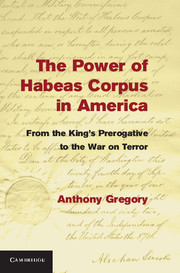'Ask any American what his most important right is, and he is apt to mention the freedom of speech, the freedom of the press, or the freedom of religion … Very rare is the person who would respond by saying, ‘the right not to be arrested and jailed arbitrarily', let alone mention the judicial writ that protects that right: the writ of habeas corpus. Lawyers know it as 'the Great Writ', and the myth holds that its availability from time immemorial is the chief reason that Anglophones have long been free. Anthony Gregory here does the estimable service of showing that the Great Writ was not always what we now understand it to be. He also lays out in excruciating, nay shocking, detail the 150-year trend, accelerating in our day, of reducing the Writ’s importance.'
Kevin R. C. Gutzman - author of James Madison and the Making of America, from the Foreword
'In his insightful and timely account of habeas corpus, Anthony Gregory illuminates not only the promise, but also the limitations of what for centuries has been known as the ‘Great Writ'. His treatment of this important subject is both eloquent and persuasive, enhancing our understanding of the relationship between law, power, and human liberty.'
Jonathan Hafetz - Seton Hall University School of Law, and author of Habeas Corpus After 9/11: Confronting America’s New Global Detention System
'Habeas corpus is arguably the most important tool for peacefully repelling tyranny and effectively holding the government accountable for its interferences with personal freedom. It can reduce the government from a gang of armed thugs on its chosen turf to a gaggle of supplicant litigants in a neutral forum. In The Power of Habeas Corpus in America, Anthony Gregory reduces 400 years of Anglo-American legal and political history to a readable, thorough, compelling study of this natural and constitutional right. This book is so well researched and written, it will soon become the bible on all things habeas corpus for generations.'
Hon. Andrew P. Napolitano - Senior Judicial Analyst, and author of Theodore and Woodrow: How Two American Presidents Destroyed Constitutional Freedom
'Especially now, as individual rights are increasingly trampled with impunity by the state, Anthony Gregory’s combination of engaging historical narrative with astute legal analysis and impassioned moral advocacy provides an overview of issues surrounding the Great Writ that is simply invaluable.'
Gary Chartier - La Sierra University, and author of Anarchy and Legal Order: Law and Politics for a Stateless Society
'Gregory emphasizes paradoxes: how a writ designed to serve liberty began as a governmental power; how a writ initially designed for individuals accused of crime is primarily sought by those who have been convicted; and how a mechanism originally used by states to question federal detentions is now almost exclusively a federal preserve … Summing up: recommended. Upper-division undergraduate, graduate, research, and professional collections.'
J. R. Vile
Source: Choice



